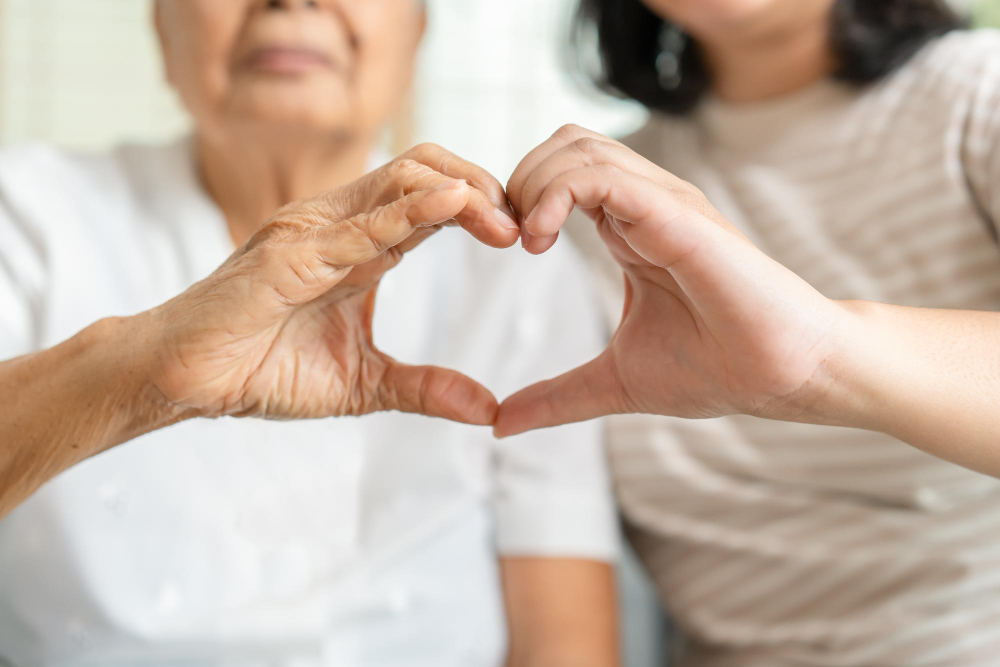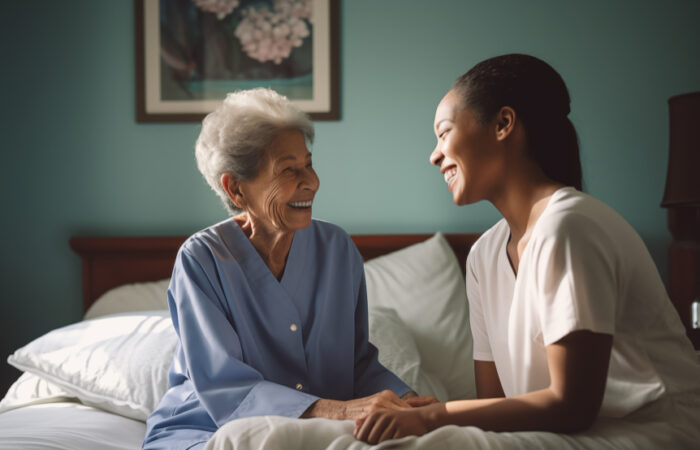
Identifying and Addressing Malnutrition in Seniors: A Comprehensive Home Health Care Guide
Home health care caretakers should always be concerned about a loved one’s nutrition intake. According to the Health and Nutrition Examination Survey, around 16% of individuals aged 65 and above in the United States consume less than 1000 calories daily. This data indicates that a significant portion of older Americans are at a heightened risk of undernutrition or malnutrition. It is important to note that the nutritional needs of seniors differ from those of younger adults, as seniors require fewer calories but a higher amount of protein, calcium, B vitamins, and other essential nutrients.
Sadly, malnutrition among seniors is a prevalent issue that often goes unnoticed. Many people believe that it is an inevitable part of the aging process. However, the good news is that there are practical measures you can take to ensure that your loved one is not susceptible to malnutrition.
These steps could make a significant difference in their overall health and well-being.
The Importance of Nutrients for Your Body
It is crucial to provide your body with the proper nutrition to perform at its best. If an individual’s body doesn’t get the required fuel or nutrients, it may result in malnutrition.
Malnutrition encompasses two main components:
- Inadequate Food Intake:
Merely having three meals daily does not ensure a balanced diet. It’s crucial to ensure your food intake consists of different nutrient-dense foods.
- Insufficient Nutrient Intake:
In addition to eating enough food, receiving adequate nutrients is crucial. Different foods contain different nutrients, so it’s essential to consider both the quantity and quality of what you consume.
For instance, let’s compare an ounce of almonds and an ounce of popcorn:
Almonds Have:
- 3.5 grams of fiber
- 6 grams of protein
- 14 grams of fat
- 37% of your daily vitamin E
- 32% of your daily manganese
- 20% of your daily magnesium
- Reasonable amounts of copper, vitamin B2, and phosphorus
Popcorn Has:
- 2.8 grams of fiber
- 2.6 grams of protein
- 8 grams of fat
- 0.1% of your daily vitamin A
- 0.1% of your daily vitamin C
- 0.3% of your daily calcium
- 4.4% of your daily iron
As you can see, even though both foods provide sustenance, almonds offer a more comprehensive range of nutrients compared to popcorn.
To ensure you’re getting the right nutrition, focusing on having a well-rounded diet comprising an extensive range of nutritious foods is crucial. This means considering the amount and the quality of the food you consume.
The Results
Neglecting proper nutrition can have severe consequences, especially for elderly individuals. Here are some of the possible consequences of malnutrition:
Physical Effects:
- Longer recovery times:
Healing from wounds and illnesses takes much longer when the body lacks essential nutrients.
- Reduced muscle and tissue mass:
Muscle wasting can occur without adequate nutrition, decreasing strength and physical functioning.
- Decreased mobility and stamina:
Malnutrition can result in a loss of muscle mass, affecting mobility and stamina.
- Breathing difficulties:
Inadequate nutrition can lead to respiratory problems and difficulties in breathing.
- Increased risk of chest infection and respiratory failure:
Malnourished individuals have a higher likelihood of developing chest infections and respiratory failure.
- Slower immune response:
Poor nutrition weakens the immune system, increasing the risk of infections and prolonging recovery time from illnesses.
- Difficulty staying warm:
Malnourished individuals may struggle to maintain a healthy body temperature, increasing the risk of hypothermia.
- Increased hospital admissions:
When the body lacks proper nutrition, it becomes more susceptible to health issues, leading to more frequent hospital visits.
- More visits to the GP:
When you don’t get enough nutrients, your immune system can weaken, and you may experience various health issues. This can lead to needing to see the doctor more often.
Fortunately, all the health above problems can be avoided or significantly reduced if your elderly loved one receives proper nutrition. Individuals can significantly improve their health and enhance their overall quality of life by ensuring they eat a balanced diet.
Causes of Malnutrition in Seniors
Home health care caregivers take note. Seniors are considered to be one of the most vulnerable groups that are likely to suffer from malnutrition. This is often due to the aging process and the many changes in the body as people get older. Malnutrition occurs when there is a lack of proper nutrients in the body, which can cause serious health problems.
Below are some of the causes of malnutrition in seniors:
- Difficulty getting food:
This can be due to several factors, including financial constraints, a lack of transportation, or mobility issues that make it difficult for seniors to leave their homes and get to the store to buy food.
- Dementia:
Seniors who have dementia may forget to eat or how to prepare meals, leading to malnutrition.
- Living alone:
Many seniors live alone and have limited social interaction during mealtime, which can lead to a lack of motivation to eat or knowledge of proper nutrition.
- Medication side-effects:
Some medications have side effects, such as a reduction in appetite or a bitter taste in the mouth, which can cause seniors to avoid eating.
- Restricted diets:
Some seniors may follow low-sodium or low-fat diets, limiting the variety of foods they eat, making it challenging to obtain the necessary nutrients required for the body.
- Depression:
Seniors who are suffering from depression or feelings of loneliness may lack the motivation to cook or even eat, leading to poor nutrition.
- Trouble swallowing:
Some seniors may have difficulty swallowing food due to dental issues or other medical conditions, making it difficult to get nutrients from food.
- Trouble eating:
Seniors may struggle with nutrition if they have sore gums, poor dental health, or other dental problems that make it hard to chew their food correctly.
How to Identify Senior Malnutrition: Signs to Look Out For
Are you concerned that your loved one may be experiencing malnutrition? It can be challenging, especially if they try hiding their habits to spare you from worrying. However, there are several signs and symptoms that you can look out for to determine if your loved one is at risk of or already suffering from malnutrition.
Here are some key indicators to spot senior malnutrition:
- Low body weight or (unintentional) weight loss:
If someone you care about has lost or is losing weight without intending to, it could be a symptom of malnutrition.
- Clothes that don’t fit like they used to:
If their clothes have become noticeably looser or no longer fit properly, it may indicate weight loss or changes in body composition due to malnutrition.
- Depression and lack of energy:
Malnutrition can lead to emotional changes and a lack of energy. If your loved one seems constantly sad, lacks motivation, or appears fatigued most of the time, it could be a sign of malnutrition.
- Memory concerns:
Malnutrition can impact cognitive function, including memory. If your loved one frequently forgets things or has difficulty recalling recent events or conversations, it is worth considering if malnutrition could contribute.
- Not remembering what or when they last ate:
If your loved one struggles to remember when they last had a meal or what they ate, it could point toward malnutrition. This forgetfulness may stem from inadequate nourishment affecting their cognitive abilities.
- Frequent illnesses:
Malnutrition weakens the immune system, making individuals more prone to illnesses and infections. If your loved one seems to be frequently falling ill, it could be due to their compromised nutritional status.
- Dry, cracked skin and slow-healing bruises or wounds:
Malnourished individuals may exhibit dry and brittle skin and wounds that take longer to heal. These issues can arise from lacking essential nutrients for skin health and wound healing.
- Old, expired food in the fridge:
If you notice expired or spoiled food in your loved one’s refrigerator, it could indicate neglect of proper nutrition. This could be a sign that they are not prioritizing their food intake or cannot maintain a balanced diet.
- Troubles chewing or swallowing:
Difficulties with chewing or swallowing can arise from oral health issues or changes in muscle strength, both of which can be linked to malnutrition. If your loved one complains of these difficulties, it may indicate malnutrition.
- Muscle weakness:
Malnutrition can result in muscle wasting and weakness. If your loved one appears to have decreased muscle tone or struggles with physical tasks that were once easy for them, it could be a sign of malnutrition.
- Falls:
Malnutrition can significantly affect a person’s balance and mobility. If you or your loved one experiences frequent falls or seems unsteady on their feet, it may be a warning sign of malnutrition impacting their strength and coordination.
13 Ways You Can Help Seniors with Nutrition
If you’ve noticed that the seniors in your care are malnourished or at risk of malnourishment, there are steps you can take to ensure they get the nutrients they need and improve their overall well-being. Here are 13 practical ways to help them:
- Prepare nourishing meals:
Focus on easy-to-eat and swallow options like soups, yogurt, smoothies, and soft foods.
- Assist with groceries:
Offer to pick up groceries, arrange delivery, and help put them away if needed.
- Plan meals together:
Collaborate on simple recipes and ensure they have all the necessary ingredients and utensils.
- Consider meal delivery programs:
Explore meal delivery options that cater to seniors’ dietary needs.
- Provide healthy snacks:
Ensure they can access prepared fruits, vegetables, nuts and seeds, and protein-filled snacks to energize them between meals.
- Consult their doctor:
Discuss the possibility of easing or modifying dietary restrictions with their doctor.
- Explore nutritional supplements:
Inquire about nutritional supplements such as prepared shakes or drinks that can support their health.
- Encourage physical activity:
Help them engage in regular physical activity, improving their appetite and strengthening their body.
- Add flavor to meals:
Incorporate spices and herbs to make meals more enticing and increase their interest in eating.
- Consult a registered dietitian:
Arrange a visit with a registered dietitian specializing in senior nutrition for personalized guidance.
- Boost protein intake:
Consider introducing protein-rich foods like meat, peanut butter, or protein powder to their diet.
- Discuss medication:
Consult their doctor about limiting medications that may worsen nutritional issues.
- Encourage support during meals:
Request family members, friends, or a caregiver to be present during mealtime to provide companionship and assistance with feeding if necessary.
Every Bit Counts When It Comes To Home Health Care
To help seniors get the nutrients they need, it is essential to understand their specific dietary requirements and ensure they have access to these foods and nutrients. Making even minor improvements in the diet of your elderly loved one can have a significant positive effect on their overall health. Feel free to start implementing changes and discussing these solutions with their healthcare provider. Remember, there is always time to make a difference.
Reach Out
Looking for a home health care agency near you? Bena Home Health Care is here to assist! Our compassionate and skilled team comprises trained in-home caregivers, including personal care aides, registered nurses, and home health aides. We understand your needs and the importance of providing top-quality care to your loved ones, and our dedicated team is here to help.
Visit our website to discover more about our services and how we can support you and your loved one. On our website, you’ll find detailed information on the various types of medical assistance, personal care, and companionship we provide.
Complete our online form and receive personalized and in-depth information about the support and care we can offer. We will address any questions or concerns, ensuring you have all the information you need to make the best decision for you and your loved one’s well-being.
Feel free to connect with us at Bena Home Care today. Our dedicated squad of compassionate and skilled personal caregivers, registered nurses, and home health aides are committed to serving families like yours with expertise and care. We understand that caregiving can be challenging, and we want to remind you that prioritizing self-care is essential. Your well-being matters too.
At Bena Home Care, we are here to provide you with the needed assistance. Contact us today to take the first step towards ensuring your loved one receives the quality care they deserve















